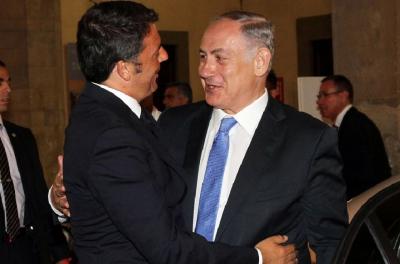Italy and Israel set-out plans for further collaboration

ROME – Italy's ENI energy concern will play a key role in energy deals between Israel and Turkey that are a key factor in the recent rapprochement between the two Middle Eastern countries, diplomatic sources said Wednesday. Israel also has named its new ambassador to Italy as Ofer Sachs.
Renzi communicated his support for the energy agreement that Israel has signed with Turkey, saying that it is “very important for the stability both in the region and in Europe.” It has been agreed that various Israeli marine gas plants that are largely managed by ENI, the Italian multinational oil and gas company, will be transfer some of the gas towards Turkey. The ENI will be the mechanism to “take” the gas to Turkey, confirming the important position of Italy in Israel’s energy project.
There was also discussion of “reciprocal collaboration” between Israel and Italy in the assistance given to four African countries: Burkina Faso, Senegal, Ethiopia and Kenya. The agreements on Africa are “very important” according to an Israeli diplomatic source, given the “numerous Israeli-Italian projects in the area”. The “bilateral and multilateral relationships” that have been agreed on by Renzi and Netanyahu link to a large amount of business for the two countries and therefore it has been deemed “worthwhile” to manage and harness the fullest extent of the oil-rich potential of these projects on the African continent.
Another area of discussion on which the two premiers have agreed collaboration, is that of cyber security. The leaders of the two countries have pledged to combine their Intelligence against terrorism, which they agreed, “presents a universal risk.” The threat of the Islamic State is in reality “far bigger than the ‘lone wolf’ image it gives off” and the only realistic way to tackle this issue “is through superior Intelligence and more highly sophisticated technology”, which can only be achieved through a formal alliance of the two countries’ resources, agreed the Italian and Israeli premiers. It has thus been decided that Israel will continue to provide its “contribution” to Italy and Europe in their “speciality” of cyber-security.
However, despite the positive consensus on the areas of collaboration between the two countries, Netanyahu took the summit as an opportunity to lament the reserve with which Europe sees Israel and to try and secure a more positive treatment in the future. The Israeli premier managed to convince Renzi into committing to a trip to the country next December, accompanied by a delegation of academics against the boycotting of Israeli products. Netanyahu put the pressure on Renzi, with the slightly menacing reminder that “Europe must understand that it is we that guarantee stability in the Middle East and therefore protect not only ourselves but also provide protection for you Europeans.”
The appointment of the new Israeli ambassador in Italy equally shows careful consideration: Sachs is not a diplomat but instead comes from the Ministry of the Economy and has an history of a four-year position as head of the Israeli Institute for export and international cooperation. According to an Israeli diplomatic source, the choice of incumbent, taking in to account his financially orientated background, is “a demonstration of the importance that we [the Israeli government] attribute to the economic relationship that we share with Italy.”
dt


